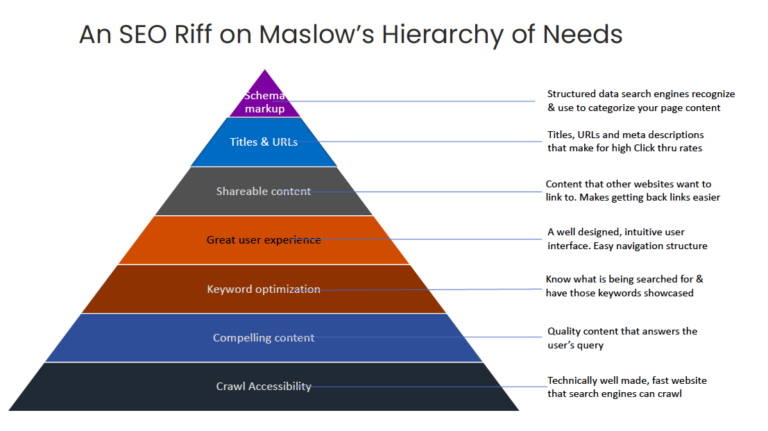This article is a really simple step-by-step SEO guide for dentists from Experdent. Let’s begin!
What is Dental SEO?
Dental SEO is the optimization of your website so that it is easy for you to be found by patients online when they search for dental treatment or any service that you offer. In other words, SEO for dentists is to make their dental office rank higher in Google or Bing or Yahoo search results.
Do people go to page-2 of Google?
Yes, people do go to page-2 of Google. However, this is quite seldom. Over 70% of searchers will click on something that falls in the first five results on a Google page. And almost 90% will click on something on page-1. The rest may likely refine their search and search again rather than go to page-2.
Is SEO Digital Marketing?
SEO is the digital equivalent of traditional inbound marketing. Let us explain:
While many activities qualify as digital marketing, SEO is the foundation for all digital marketing processes. Conversely, a weak SEO can result in massive marketing expenditure to get results online.
SEO builds cred for you with search engines. Think of it as a virtuous loop. The better the SEO for a website, the higher it will rank in search results. The higher it ranks in search results, the more people will click on it. The more people click on a consequence, this tells Google/Bing or any other search engine that yours is a quality website, and therefore the search engines push up the rank of your website even further.
A high-ranking site on Google search, therefore, becomes a magnet for visitors. More visitors will lead to more conversions in any marketing funnel, i.e., more people becoming dental office patients.
Does SEO improve the visitor experience on your website?
The foundation of SEO is in Technical SEO. Let’s unpack that:
SEO work for any quality SEO services business starts with a detailed website audit. This audit looks to fix these key elements that go into user experience:

A Step-by-Step SEO Guide for Dentists in 2021. Photo Courtesy: Photo by Miguel Á. Padriñán from Pexels
– Performance on Mobile
– Intuitive navigation
– Presence of Metadata including alt tags for images
– Presence of appropriate keywords on pages
– Submission of sitemaps to search engines
In addition, SEO looks for compelling content and quality images and video to create an engaging experience for the visitor to a website.
Through this process, technical SEO helps improve user experience while improving the website for search engines to crawl.
Is SEO advertising?
The output of SEO is greater visibility for your content for the people who are searching for that content.
Let’s say you live in downtown Toronto and you have a toothache. You will likely open up your computer or your smartphone and search something like this:
– Family Dentist in downtown Toronto or
– Dentist for a toothache or
– Best dentist in Toronto or if its evening or the weekend
– Dentist in Toronto open today
If your website is optimized for SEO and contains this information (preferably in the schema), then your visitors may see your website featured on page-1 of Google. Thus, SEO is advertising by another means.
Content that ranks is the best advertising because research has repeatedly shown that people will click on an organic link that appears more authentic.
Research by Wordstream.com shows that “Clicks on paid search listings beat out organic clicks by nearly a 2:1 margin for keywords with high commercial intent in the US. In other words, 64.6% of people click on Google Ads when they are looking to buy an item online!”
And here is the kicker – When you run an ad campaign, you get results only while the campaign is running and you are paying for clicks on your ad. In the case of SEO, however, you continue to get results for a long time.
Yes, if you don’t continuously optimize your website for SEO, your Search Rankings will eventually begin to drop.
Why is that, you ask? Simply because your neighbours and competitors will not have stopped, they will continue improving and scaling their websites, and as a consequence, Google will keep pulling other websites over yours.
On-Page optimization
Getting Google to like your website and show it on page-1 of its search results means that you need to bring quality to your pages and make them valuable and delightful for your visitors.
Remember that the best websites are built for real visitors and not for search engines.
The key elements that SEO helps you improve on-page are:
– The quality of content on its page and its layout and organization for easy flow. The presence of images and video.
– Headlines, subheadings are identified by Headline tags. For example, a page should ideally only have one headline tagged with an H1 tag. Sub headlines can go to H2 or H3 tags. Sub-sub headlines can go to H4, H5, and even H6 tags.
– Metadata and descriptions that encourage clickthrough. This is the data that search engines showcase your pages within search results.
– The amount of content on the page. Although the jury is still out on the length of an ideal article for Google to show it on page-1, research shows somewhere between 1000 and 1500 words. This does not mean that a page with 5000 words will consistently rank higher than a page with 1000 words.
However, it does mean that when choosing between 2 pages that are otherwise identical in quality of content, Google will likely choose to showcase the page with more content in a higher position.
– The number of pages on your website (remember, more is not always better).
– The freshness of your content etc.
Off-Page optimization
The links that other sites on the internet provide your website are essentially treated like votes. The larger the number of websites linking to your website or providing you with backlinks, the larger the number of votes for your website. This quantity of links helps Google decide where to rank your website.
That said, all backlinks are not born equal. For example, a link from a higher ranking website carries more value than a brand new one-page website.
Some backlinks can be toxic and be damaging for your website’s rank on Google. (More on toxic backlinks and how to get rid of those in a future article).
The list for how off-page links create value for you can be bullet-pointed as follows:
– Citations or directory listings
– In context, backlinks from articles or guest blogs
– is the link reciprocal – this practice has the potential to reduce the value of the link received
– The nature of the website that the link comes from: i.e., is the website in a related space? A link from a gambling website for a dentist is not likely to count as useful.
– Keywords in anchor text could indicate that the link has been sourced or purchased. The best links have anchor text that is just the URL of your website or “read more” or “click here,” etc.
Technical SEO
We have mentioned earlier that Technical SEO is the foundation of SEO for a website. The critical elements of the work done under technical SEO are
– Identification and removal of Crawl errors.
– Check if your website is secure – check for HTTPS status
– Check if XML sitemaps exist & if they have been submitted to major search engines
– Check and improve Site Load time
– Check whether the site is mobile friendly and upgrade as needed
– Check and optimize robots.txt files
– Check for keyword cannibalization and edit as needed
– Check and improve site metadata, including image alt tags
– Check for broken links and eliminate them or apply a 301 redirect that passes full link equity (ranking power) to the redirected page.
Yoast, a company that provides an extremely popular SEO plugin for WordPress websites, in addition talks about the need for technical SEO to ensure that there is no duplicate content, nor are there any dead links in the website.
As a dentist, how do I build a high-quality website myself?
While we would recommend that you hire an experienced web developer to help develop or update your dental website, you could build a workable website quite easily as a DIY project
There are many website development tools available, and you could choose between them for your DIY project. Three major platforms that you could use are:
– WordPress
– Squarespace
– Wix
WordPress will need the most significant amount of expertise, while both Squarespace and Wix use drag and drop functionality for you to build something quickly.
There is an argument between SEOs about whether or not SEO is easier to do on WordPress versus Wix or Squarespace. However, what is clear is that WordPress enjoys a much larger ecosystem which gives you access to better tools and developers than does any other website builder.
According to Search Engine Journal “WordPress content management system is used by 39.5% of all sites on the web.”
Choose a reliable & high-quality hosting company
If you go with Wix or Squarespace, the hosting is with the website builder’s platform. If you build with WordPress or any other website builder platform, you will need to choose a high-quality, fast, and secure hosting service.
Some of the major hosting services that you could consider are:
– Amazon Web Services
– Bluehost
– Godaddy
– WPengine
– Siteground
– Hostgator etc.
There are quite literally hundreds of hosting companies for you to choose from. Choose a hosting service that has close to 100% uptime, which has enough bandwidth for your clients to visit without the speed of your website going down.
Over and above that, the hosting service should have robust security and offer you a service of backups so that if your website gets damaged or hacked, they can put back the site in a matter of minutes.
How do you do keyword research?
As a dentist, you have a scarcity of time. Still, given that you have decided to build a DIY website, you need to ensure that you do keyword research so that Google recognizes your content to contain the answers your future patients or clients are searching for.
Some of the tools that you could use for keyword research are:
– Google Keyword planner – this is a free tool
– Semrush/Ahrefs/Moz – these are paid tools but will help you in getting a solid grounding of keywords.
Submit your site to Google
Once your website is ready, make sure to create your presence and submit it to the search engine with the following tools:
– Google My Business
– Google Maps
– Bing Places
– Yahoo Small business – Unfortunately, this tends to work only in the US unless you subscribe to some listing services.
Google Tools to monitor your website performance
These tools will help you gauge the performance of your website traffic and help you find points of strengths and weaknesses on your website:
– Google Search Console
– Google Analytics
– Google Page Speed Insights
List yourself on review sites
While the best website for reviews that self selects itself is your Google my business (GMB) page. You would also find reviews very helpful from the following websites.
– Yelp
– RateMyMD
– Healthgrades
List your practice in online directories
A presence in online directories is a crucial aspect of SEO for any business. You should list your dental practice in as many relevant directories as possible. There is a wide variety of directories available, and you should choose well. Your choices will be along the lines of:
– Local yellow pages or equivalent
– Directories for your town or province
– Directories for Dentists or healthcare providers
– Directories of local chambers of commerce or industry organizations
Is your Dental SEO strategy from this Step-by-Step SEO Guide for Dentists in 2021 working?
Once you have done all this work, you will need to ask how you find out if your dental strategy is working?
To get this answer, you will need to check for some of the following:
– Website traffic – this is the first and foremost indicator of performance
– Ranking keywords – What is the page and rank of each of the keywords you believe to be vital. And, of course, how do these keyword ranks change over time.
– Reviews – the number of reviews and the grade you get on your reviews is outside SEO in a technical sense.
However, reviews create a very favourable feedback loop for search engines. Generally speaking, a large number of reviews will push a website up in ranking.
How do you find how you rank without subscribing to expensive SEO tools?
If you check your keywords using your computer, the computer will respond based on your search history, thereby potentially fooling you into thinking that your rank has improved.
Instead, there is a simple trick to finding how you rank for your target keywords. First, open an “incognito” session in a browser such as Chrome and then search for your keyword. If you don’t find it on page-1, go to page-2 continue until you find it.
Of course, if you don’t rank even on page-10, then functionally, you don’t rank for that keyword.
How can Experdent help?
While you can most definitely do all of the work that we have enumerated here, you could choose to get expert help to create powerful SEO for your website. Following this Step-by-Step SEO Guide for Dentists in 2021 will help you get on the path of achieving your SEO goals.
At Experdent, our focus is SEO for dentists, and that is just what we do. So, get in touch, send us an email, or call us to set up a time to chat very quickly. At Experdent Web Services, we put these very ideas into practice.
We are results-driven, dentist-focused, and experts in SEO for dental offices in North America. So, if you are a dental office looking for SEO or need advice on your digital strategy, call us for a free 30-minute consult.









